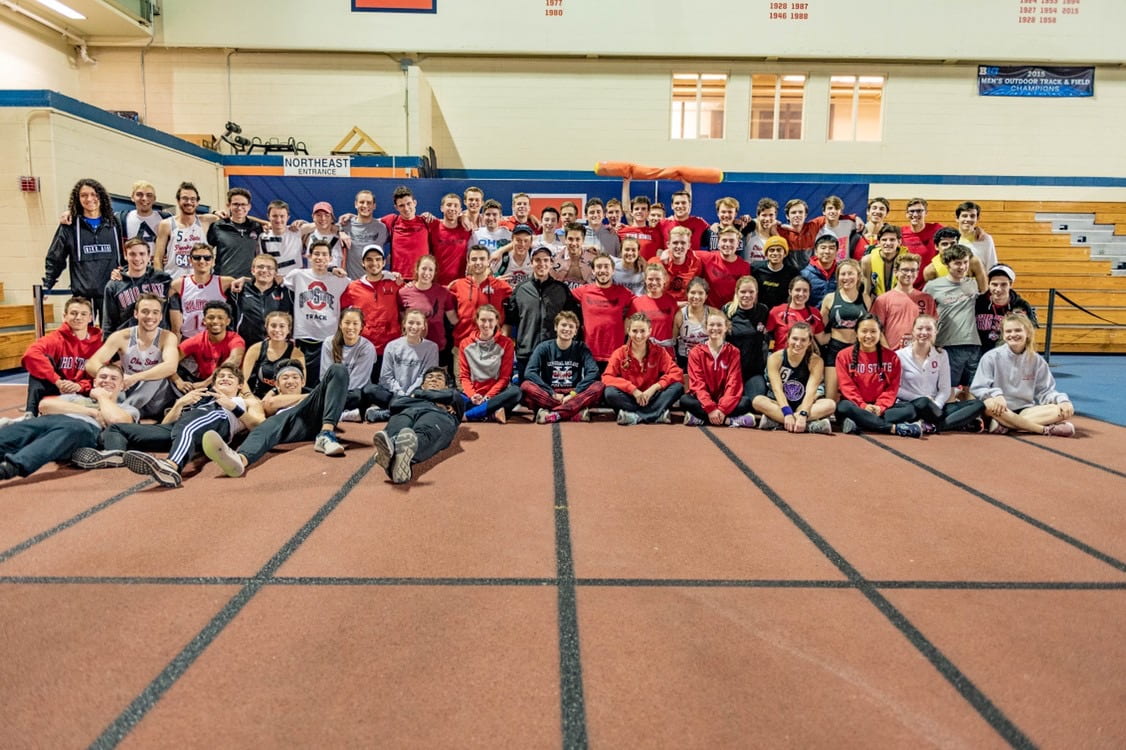
The Ohio State Running Club at Illinois Club Relays, an indoor meet at the University of Illinois in February 2020. Credit: Courtesy of Matt Polatas
In the evening of the first Friday of the semester, Matt Polatas, president of Ohio State Running Club — along with all Ohio State student organization leaders — received an email from the Office of Student Life. All club events would be required to happen online for the next two weeks, until Sept. 9.
The email came after the university reported a total of 366 student COVID-19 cases — a number that has now reached 1,500. Since then, student organization members have put their heads together to stay connected while apart until the restriction is released.
Polatas said even before the email was sent out, he and the rest of the organization’s leaders implemented measures such as creating smaller groups and staggered running times to limit the spread of the coronavirus. Despite their efforts, a 150-person turnout at the start of the season led to a few runners testing positive for COVID-19. He said the email from the Office of Student Life gave the organization time to strategize.
“I guess the plan moving forward, assuming that we are able to come back, would be to have even more structure in our groups, probably in the form of a sign-up sheet,” Polatas said.
He said that the group’s new changes will take some adjustment, but the organization will help with contact tracing in hopes of preventing large outbreaks in the club.
“We can be able to say, ‘OK, these people are the ones who ran with the person that tested positive,’ rather than having to shut the whole club down because we don’t know who they interacted with,” Polatas said.
Polatas said the organization accommodates a wide range of athletes. The turnout is a mix of people ranging from competitive long-distance runners in the fall, field athletes in the winter and spring track seasons, people who want to make friends and everything in-between.
“There’s not a ‘This is what Running Club is for everybody,’ it’s, ‘This is everything that it can be,’ and it’s really up to individuals to decide what they want to get out of the club,” Polatas said.
Emma Rodrigo, who is in charge of member relations for the Ohio State chapter of Public Relations Student Society of America, said her student organization had a different experience going online. Rodrigo, a third-year in strategic communication, said PRSSA normally invites outside public relations speakers to its meetings in order to educate members and allow students to build professional and personal relationships within the field, so going virtual was a relatively “seamless transition.”
“The public relation, communication, marketing industry in general is more geared to a digital realm,” Rodrigo said. “I feel like a lot of our speakers have been on Zoom, that’s kind of their world as well. It’s kind of a very adaptable industry in a lot of ways. There’s always new trends, new platforms that our industry needs to stay on top of.”
Despite that adaptability, the PRSSA executive board has still had to strategize to ensure members continue to receive the same opportunities and potential members know those opportunities are available to them.
“A lot of our recruiting, specifically from my perspective, comes from going into pretty big, entry-level communication classes and just recruiting members from there,” Rodrigo said.
With many of those classes now online, Rodrigo and her fellow club members are relying on bringing in guest speakers with Zoom meetings to attract new recruits.
Both Polatas and Rodrigo have seen the structures of their organizations change somewhat, but while Rodrigo is able to hold meetings on Zoom, Polatas and the Running Club don’t have that option. Polatas said he thinks having more oversight from the Office of Student Life and people overseeing student organizations would have been helpful, but he understands the difficulties they face.
“It’s super hard because there are just so many [student organizations] at Ohio State,” Polatas said.
He said he received excellent feedback from his organization’s adviser as well as from his adviser’s wife, who works in the Office of Student Life.
“It’s just been from a standpoint that we have to be proactive as a club and reach out and get that feedback and help rather than having someone that’s asking us those hard-hitting questions like, ‘OK, what is your plan when somebody tests positive?’ Because sometimes we forget those things when we’re planning,” Polatas said.
The club found out in July that the majority of its competitions were canceled, and it had to get rid of its traveling competitive season, Polatas said.
Despite not competing, the Running Club is still able to interact with its members with a Minecraft server, a club Fantasy Football league and core workouts over Zoom.
“If it comes to the point that we aren’t able to come back, we want to try and get back and be in person and do things in a safe way,” Polatas said.


